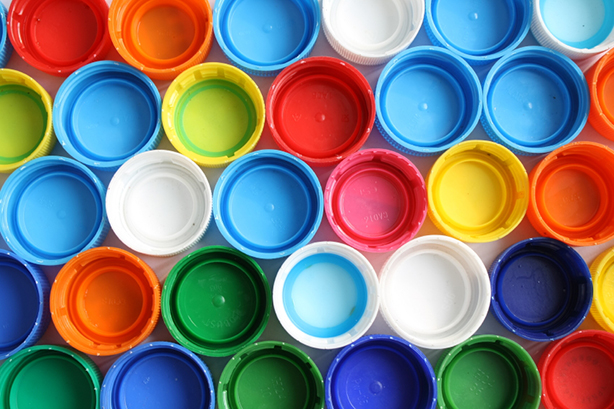When it comes to everyday packaging materials, there are some items that various curbside recycling programs do not accept. Items like paper-based milk cartons and plastic bags can cause many consumers much confusion.
One of biggest mind-bogglers is plastic or metal twist-off caps found atop bottled beverages. While it would seem so easy to recycle both the bottles and the lids together, it is still not a likely possibility. So, why can’t we recycle the two together?

Plastic bottle caps
For the plastic pair, the bottle and the cap are not made of the same type of plastic. Soda bottle are mostly made from Plastic #1 (polyethylene terephthalate), while bottle caps are made from Plastic #5 (polypropylene). Different resins melt at different temperatures. Therefore, Plastic #1 and Plastic #5 must be recycled separately; otherwise the plastics would melt unevenly and ruin the entire batch.
Bottle caps are sometimes removed at the recycling facility — many facilities have employees that are paid to hand sort and remove the unwanted trash. But, if the recycling haul seems to have large amounts of unwanted trash, then workers may throw out the entire bin. Sorting slows down the recycling process and increases the cost, which is why it is cheaper for most recycling facilities to trash it.
In addition, plastic containers with their caps screwed on tightly present a safety hazard for recycling workers. If they have not already cracked during transportation, tightly fastened caps can explode when the temperature increases. Given this potential safety issue, many recycling plants refuse to take them all together. If your recycling facility does not accept these items, you might check surrounding towns to see what their programs are like.
If you are running out of options to recycle your bottle caps, Aveda offers a
cap collection guide that accepts Plastic #5. The list of accepted caps include: caps on shampoo bottles, water bottles, soda bottles and other beverage bottles, milk jugs, pharmaceutical lids, flip-top caps on tubes and food product bottles, laundry detergent caps and peanut butter lids. For more information on recycling plastic caps, please email
capcollection@aveda.com or call 1.877.AVEDA09.
Metal bottle caps
Metal bottle caps are often made of steel with an affixed plastic seal. Because of the makeup of plastic and metal, these usually can be recycled, but they sometimes jams the processing machines, making this task significantly more time consuming. These items don’t cause contamination issues, so many recycling facilities will take them and sort them by using magnets.
However, not every recycling center can accept metal bottle caps, so if your recycling program is unable to process them, there are other creative ways to reuse these items. For example, you can reuse the metal bottle caps for home brewing. In addition, bottle caps can be made into interesting craft projects such as bottle cap jewelry or checkers. Second Chance Studio offers a step-by-step tutorial of
recycled bottle cap necklaces. This not only keeps the bottle caps out of the waste steam, but also can help save you some cash along the way.
Cap recycling is the way of the future
So, instead of trashing leftover plastic or metal caps, recycling these materials when you can is always best. Because it is a slow process on the manufacturing end, cap collection is becoming a greater hassle due to much effort involved for such tiny pieces of plastic or metal. Recycling processing equipment has improved immensely to make this process run more smoothly, but it usually comes at a hefty price. Our hope is that more recycling programs like Aveda will surface, but also that curbside recycling programs across the U.S. will expand their acceptable materials. We are taking steps in the right direction, so perhaps one day there will be no question about throwing the bottle cap in the recycling bin.

